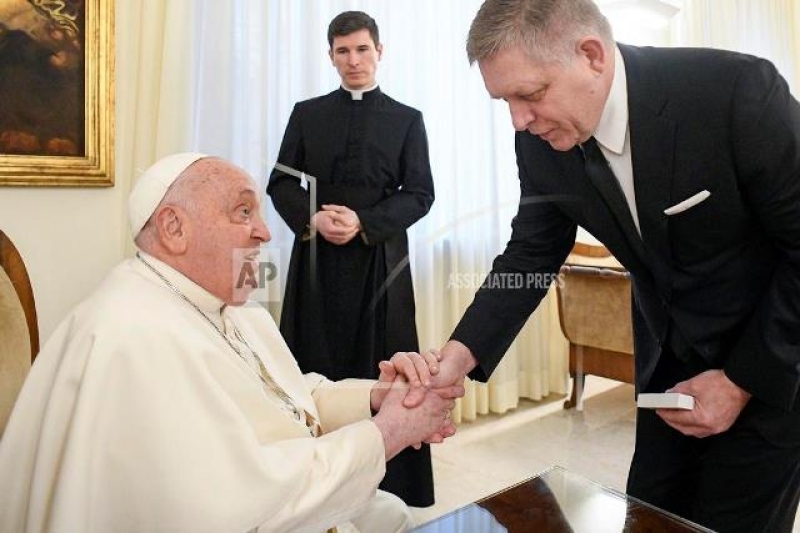- Bangladeshi Expats Cast 4.58 Lakh Postal Votes |
- IMF Forecasts Bangladesh GDP to Rebound to 4.7% in FY26 |
- Arab Allies Urge Restraint as Trump Presses Iran Talks |
- EC asks printing presses not to print election posters |
- Protect your votes, conspiracies still on: Tarique to voters |
Pope Francis diagnosed with pneumonia

Pope Francis is in a hospital to treat brokchitis. Photo AP
The Vatican reported that Pope Francis had a restful night and had breakfast on Wednesday after being diagnosed with pneumonia in both lungs, adding to concerns about the 88-year-old pontiff’s ability to combat the infection.
A Vatican spokesperson shared an early morning update on Wednesday, stating that Francis spent his fifth night at Rome's Gemelli hospital without issues. "He had a peaceful night, woke up, and had breakfast," the spokesperson said.
On Tuesday, the Vatican confirmed the pneumonia diagnosis and added that Francis' respiratory infection is accompanied by asthmatic bronchitis, requiring cortisone antibiotic treatment. "Laboratory tests, chest X-rays, and the Holy Father’s clinical condition continue to present a complex picture," the Vatican said.
Despite the situation, the pope, who had part of his right lung removed in his youth, remains in good spirits and is thankful for the prayers for his recovery, according to a late update from Vatican spokesperson Matteo Bruni.
Francis was admitted to the Gemelli hospital on Friday in "fair" condition after his bronchitis worsened. On Monday, doctors determined that he had a polymicrobial respiratory tract infection, meaning a mix of viruses, bacteria, and potentially other organisms had infected his airways.
A follow-up CT scan on Monday revealed the development of bilateral pneumonia, prompting the need for additional medication, Bruni noted.
Bronchitis can lead to pneumonia, a serious infection of the lungs. Pneumonia is more dangerous when it affects both lungs, as there is no healthy tissue to compensate for the damage.
Treatment depends on severity but may involve oxygen support, intravenous fluids, and addressing the underlying infection. So far, Pope Francis has not needed supplemental oxygen, has had breakfast daily, read the newspapers, and worked from his hospital room.
The Vatican has not disclosed how the pope is responding to his medication, other than confirming he does not have a fever.
Dr. Carmelo D’Asero, an infectious disease expert, pointed out that the absence of a fever is not necessarily a good sign given the severity of the infection. "A high fever indicates the body’s immune response," he said. "A low fever in the presence of a serious bronchial infection suggests a weaker immune response, which is concerning. It might actually be better if he had a fever."
The Vatican has not specified how long the pope might stay in hospital, but noted that his treatment for this "complex clinical picture," which has already led to multiple changes in his medication, will require an "adequate" period of hospitalization.
In a hopeful sign, a rainbow appeared over the Gemelli hospital on Tuesday afternoon, and Francis received well-wishes in the form of drawings and cards from children in the hospital’s oncology ward. - AP/UNB

